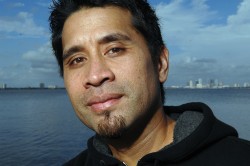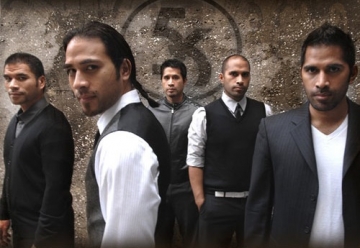 The Katinas have been in the headlines recently, asking for prayers and support for their native American Samoa, which was hit by a tsunami on September 29.
The Katinas have been in the headlines recently, asking for prayers and support for their native American Samoa, which was hit by a tsunami on September 29.
The following is an excerpt, with some updates, from an interview I did with Sam Katina back in 2002, when their worship album Lifestyle: A Worship Experience was released. Since then, the band has gone on to release several more albums; their most recent release, 2008’s Still, is the first release on their own Record label, Destiny Productions.
While the interview is a bit dated, what Sam Katina has to say about a lifestyle of worship is still true these years later. Since some of you probably aren’t familiar with the band, I thought you might enjoy a little insight into what Sam has to say about developing a lifestyle of worsh. And don’t foreget that The Katinas will be hosting a benefit concert for the Samoan Islands on October 7th):
Sam Katina Talks About The Lifestyle of Worship:
For the Katina brothers – Jesse, James, Joe, John and Sam – it was apparent early on that music was their destiny. Sam, keyboardist and vocalists, remembers being 5-years-old and banging on pots and pans with his brothers, playing guitars that older brother David cut out of cardboard boxes, and inviting friends over to watch the “band” lip synch to Andre Crouch records. “Growing up, we were always performing. Even if it was just for our family, that was a crowd,” Sam laughs.
After moving to the States, they toured the country performing at churches and youth events, signing with Gotee Records in 1997 and releasing albums in both English and Spanish.
But the worship lifestyle also began early for the Katinas. As children growing up in the islands of American Samoa, David (who is not a member of the band; he pastors a church in Hawaii), Sam, Joe, twins James and John, and Jesse were awakened each morning between 4 am and 6 am by their father, a Pentecostal preacher, for a time of worship and devotions (‘I don’t think God’s up this early!’ they’d joke). While their school mates were playing sports after school, the brothers were at their dad’s church, helping out and playing music.
God laid a solid foundation for the boys to pursue a lifestyle of worship and music.
“When my mom died, I remember her putting her hand on our forehead, even while she was lying on her deathbed, and she said, ‘Lord, I want you to use these boys to benefit Your kingdom and to impact the kingdom of God.’ She prayed that prayer for the last three months of her life.” Sam says that was before the brothers had ever even thought about making music a career. “Every day we see God answer Mom’s prayer. We’re so thankful for a praying mom.”
They’re also thankful for the lesson their dad taught them about making time daily to worship. “In the islands, the pace of living was much slower than here,” Sam adds. “We grew up always looking for a time to worship. It’s even more important living in the fast pace here in the States.”
Sam understands that it’s easy to make worship a routine, simply singing the songs, playing the part. “I grew up in a Pentecostal setting, in a very religious setting,” he says. “Even though dad taught us to worship, it was easy to just fake it. It was easy to lift your hands, say the right things, but then not really address issues in your life.” That’s why it’s important to develop your own time with God, to learn to worship in private, with the doors closed.
“You’re not always going to have the convenience of a band or an atmosphere with a lot of other worshippers,” he adds. Instead, true worship begins when you shut yourself away in a place where it’s just you and God. “Worship can be a time of transition, a time where you sense God’s presence deeper and deeper as you spend time with Him.”
Sam had experienced both transition and alone time with God when I spoke with him in 2002, when he took a year long sabbatical from the band. He felt that he owed it to his family (he and his wife Kathi Ann have four daughters) to take a break from the heavy touring he’d been doing ever since graduating from high school. The music started to feel like work, and he felt like he was going through a dry time spiritually as well.
“I really felt that I needed to appreciate again what I did as a musician, and when I got back … it was amazing, the freshness that I felt.” But more importantly, he was able to recharge spiritually during his sabbatical. “I was able to hang out with the pastors, and really see what they do in the kingdom, and I really got to mentor and disciple other men in our church.” All of the Katina brothers are heavily involved in their churches, and being able to “plug in” during his time off is just what Sam felt he needed. In fact, he hopes that each of his brothers will take the opportunity to take a sabbatical.
And it’s easy to see that the joy is back. “Sometimes, after a show, we’re backstage for 5 or 10 minutes, just laughing and realizing how much of a blast it is to worship God,” he says.
“The Bible says that in the instant you decide to serve God, you can sense the warmth and joy and peace of being in His presence,” Sam says, encouraging people to experience some time alone with God. “One man put it this way: ‘The secret of success is the success of what you do in secret’. I think that pretty much sums it up.”
If you’d like to help, you can donate through the band’s missions fund.
For more information about The Katinas, visit their website.
Click here to subscribe to Gospel Soundcheck by email and have the Gospel Soundcheck headlines delivered daily to your email inbox. And don’t forget to follow me on Twitter!

